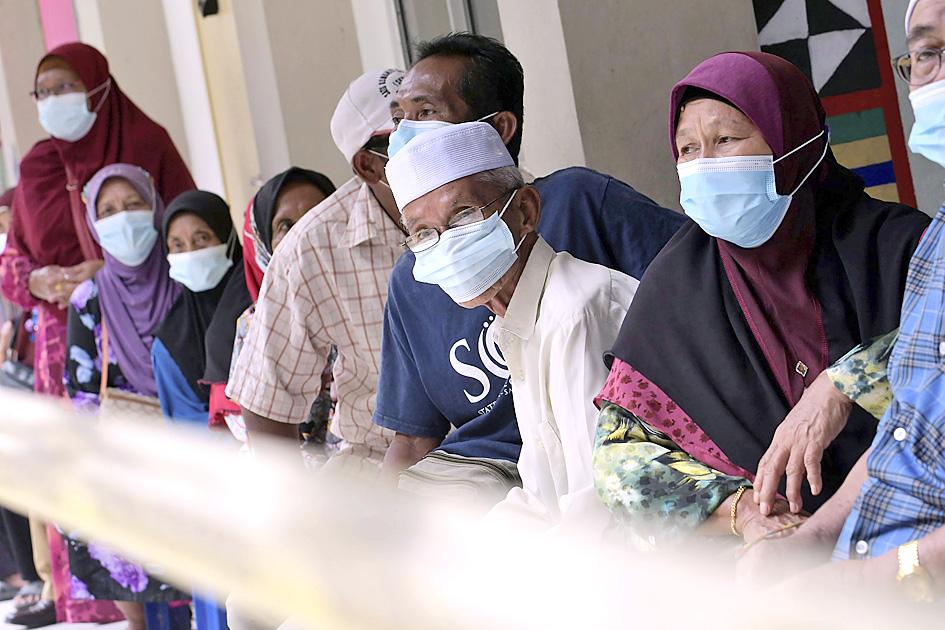Polls yesterday opened in Malaysia’s eastern Sabah state in a vote seen as a referendum for embattled Malaysian Prime Minister Muhyiddin Yassin’s seven-month-old unelected government.
The leader of the opposition-ruled state dissolved the assembly on July 30 to seek early elections and thwart attempts by Muhyiddin’s ruling alliance to take over Sabah through lawmakers’ defections.
The stakes are high for Muhyiddin after opposition leader Anwar Ibrahim on Wednesday said that he has secured majority support in the Malaysian parliament.

Photo: AP
“This is the first state-wide election since the creation of Muhyiddin’s government in March. In a way, it is an indirect referendum on whether the people are happy with the formation of the backdoor [unelected] government,” University of Tasmania Asian studies professor James Chin said.
Sabah and Sarawak on Borneo hold about one-quarter of the parliamentary seats and are seen as crucial for political leverage.
The two states — which are rich in oil and timber, but among the poorest in Malaysia — have a greater level of autonomy in administration, immigration and judiciary.
The attempted takeover of Sabah was reminiscent of how Muhyiddin took power in March after defecting from the reformist government to form a new Malay-centric administration.
Muhyiddin’s alliance has since taken control of many states after lawmakers defected.
The opposition now controls only Sabah and two of the country’s richest states, Selangor and Penang.
However, Muhyiddin has been struggling to maintain support amid infighting in his coalition that has just a slim two-seat majority.
His leadership is in further doubt after Anwar claimed to have won majority support, including from lawmakers in Muhyiddin’s camp.
Anwar has not revealed details, as he is waiting to meet with Malaysia’s king, who is receiving treatment in a hospital, because the king has the power to appoint a new prime minister or dissolve the parliament for early general elections.
Muhyiddin has said that Anwar’s declaration was a mere allegation until he provides evidence.
Muhyiddin has campaigned heavily in Sabah, pledging development. Billboards of his smiling face dubbed “Abah,” or father, are prominent in many constituencies.
By contrast, former Sabah leader Shafie Apdal urged the state’s multiple Aboriginal communities to reject Muhyiddin’s Muslim government and unite behind him.
“A win will strengthen Muhyiddin’s position but a loss will embolden Anwar’s attempt to reclaim power,” Singapore Institute of International Affairs senior fellow Oh Ei Sun said.
The Sabah election is heavily contested, with 447 candidates vying for 73 state seats, and more than 1 million eligible voters.
Nearly half of China’s major cities are suffering “moderate to severe” levels of subsidence, putting millions of people at risk of flooding, especially as sea levels rise, according to a study of nationwide satellite data released yesterday. The authors of the paper, published by the journal Science, found that 45 percent of China’s urban land was sinking faster than 3mm per year, with 16 percent at more than 10mm per year, driven not only by declining water tables, but also the sheer weight of the built environment. With China’s urban population already in excess of 900 million people, “even a small portion

UNSETTLING IMAGES: The scene took place in front of TV crews covering the Trump trial, with a CNN anchor calling it an ‘emotional and unbelievably disturbing moment’ A man who doused himself in an accelerant and set himself on fire outside the courthouse where former US president Donald Trump is on trial has died, police said yesterday. The New York City Police Department (NYPD) said the man was declared dead by staff at an area hospital. The man was in Collect Pond Park at about 1:30pm on Friday when he took out pamphlets espousing conspiracy theories, tossed them around, then doused himself in an accelerant and set himself on fire, officials and witnesses said. A large number of police officers were nearby when it happened. Some officers and bystanders rushed

HYPOCRISY? The Chinese Ministry of Foreign Affairs yesterday asked whether Biden was talking about China or the US when he used the word ‘xenophobic’ US President Joe Biden on Wednesday called for a hike in steel tariffs on China, accusing Beijing of cheating as he spoke at a campaign event in Pennsylvania. Biden accused China of xenophobia, too, in a speech to union members in Pittsburgh. “They’re not competing, they’re cheating. They’re cheating and we’ve seen the damage here in America,” Biden said. Chinese steel companies “don’t need to worry about making a profit because the Chinese government is subsidizing them so heavily,” he said. Biden said he had called for the US Trade Representative to triple the tariff rates for Chinese steel and aluminum if Beijing was

Beijing is continuing to commit genocide and crimes against humanity against Uyghurs and other Muslim minorities in its western Xinjiang province, U.S. Secretary of State Antony Blinken said in a report published on Monday, ahead of his planned visit to China this week. The State Department’s annual human rights report, which documents abuses recorded all over the world during the previous calendar year, repeated language from previous years on the treatment of Muslims in Xinjiang, but the publication raises the issue ahead of delicate talks, including on the war in Ukraine and global trade, between the top U.S. diplomat and Chinese